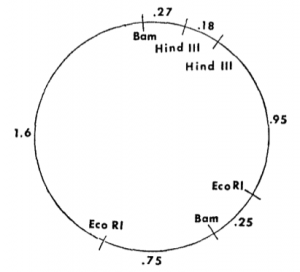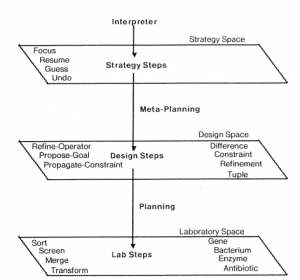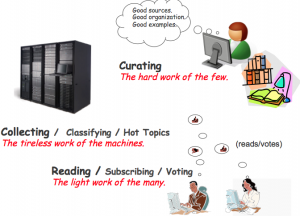Can technology have a substantial cognitive role in automating knowledge work? This core interest is about mechanisms that automate knowledge work, reasoning, and problem solving.
 In 1976 Geoff Dromey, Tom Rindfleisch, Alan Duffield, and I publshed a paper in the Journal of Analytic Chemistry on the Extraction of Mass Spectra from gas chromatography and mass spectrometry data. The technology was all about signal and data processing. That’s analogous to perception. A mass spectrometer is a kind of electronic nose for identifying chemicals. Our program handled issues with a noisy (smelly?) environment.
In 1976 Geoff Dromey, Tom Rindfleisch, Alan Duffield, and I publshed a paper in the Journal of Analytic Chemistry on the Extraction of Mass Spectra from gas chromatography and mass spectrometry data. The technology was all about signal and data processing. That’s analogous to perception. A mass spectrometer is a kind of electronic nose for identifying chemicals. Our program handled issues with a noisy (smelly?) environment.
But could information systems go beyond perception and play a substantial cognitive role? Could they solve problems that are difficult for people? The field of expert systems had just begun. The Dendral project was demonstrating that an expert or knowledge-based system could infer the structures of organic molecules from various kinds of spectroscopic data. Josh Lederberg challenged me to write a program that would solve the DNA structural problems in his laboratory using segmentation data. The first program I developed copied how people solved the problem, based on talking out loud protocols. The program got correct answers, but its performance degraded when it had more data. This seemed wrong, since increased data provided more hints and intuitively should make the problem easier. When I understood how to organize the program’s problem-solving behavior properly as a hierarchical generate-and-test search, the approach was published in Artificial Intelligence as Inferring DNA Structures from Segmentation Data. This paper began my journey to modeling problem-solving as search at a knowledge level.
 Experiment planning in genetics is much more difficult than solving structural puzzles. It requires knowing a fair bit of genetics. It is complex because biological agents interfere with each other. Could the experiment planning process be done by computer? Could it potentially assist scientific discovery? I explored this in my doctoral dissertation, directed by Bruce Buchanan and Ed Feigenbaum. In 1980 Artificial Intelligence published two papers about the MOLGEN system for planning gene cloning experiments in molecular genetics. The paper Planning with Constraints reported on a hierarchical planning system that achieved efficiency on solving coupled subproblems by explicit symbolic posting and propagation of constraints over plans. A second paper Planning and Meta-Planning described a three-level architecture of a reasoning system that moved between backtracking-heuristic search and least-commitment reasoning as needed. These papers showed that a system could reason quite deeply in knowledge processing.
Experiment planning in genetics is much more difficult than solving structural puzzles. It requires knowing a fair bit of genetics. It is complex because biological agents interfere with each other. Could the experiment planning process be done by computer? Could it potentially assist scientific discovery? I explored this in my doctoral dissertation, directed by Bruce Buchanan and Ed Feigenbaum. In 1980 Artificial Intelligence published two papers about the MOLGEN system for planning gene cloning experiments in molecular genetics. The paper Planning with Constraints reported on a hierarchical planning system that achieved efficiency on solving coupled subproblems by explicit symbolic posting and propagation of constraints over plans. A second paper Planning and Meta-Planning described a three-level architecture of a reasoning system that moved between backtracking-heuristic search and least-commitment reasoning as needed. These papers showed that a system could reason quite deeply in knowledge processing.
 John McCarthy said “Look Ma, No Hands!” referring both to a kid showing off riding a bicycle without training wheels and to intelligent systems running by themselves. These systems ran automatically, but had no substantial interaction with people. Is that really a virtue? Could systems work better if people and machines collaborated?
John McCarthy said “Look Ma, No Hands!” referring both to a kid showing off riding a bicycle without training wheels and to intelligent systems running by themselves. These systems ran automatically, but had no substantial interaction with people. Is that really a virtue? Could systems work better if people and machines collaborated?
Projects: MOLGEN, Knowledge Systems, Collaborative Analytics
Books: Introduction to Knowledge Systems
